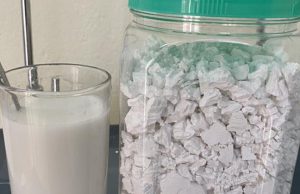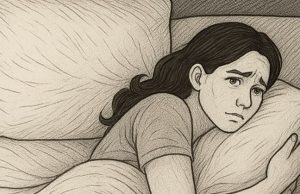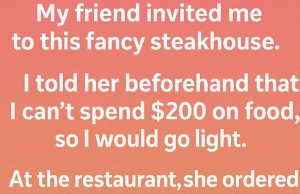
My name is Mrs. Margaret, and I am currently in my early sixties. Since my husband died ten years ago, I have been living alone in a little Kansas town.
My biggest pride is my daughter, Helen. She is smart, elegant, and married to Daniel, a thoughtful and compassionate man. The news that Helen was expecting filled my heart with happiness. Every day, I prayed for a safe delivery.
In order to assist in caring for my granddaughter, I packed up my belongings and moved from the country to their suburban home close to Dallas when she eventually gave birth to Nora. During those initial, priceless months of Nora’s life, their small, humble home quickly became my home.
In the beginning, life felt simple. I cooked breakfast, did the laundry, while Daniel worked long hours but always came back to help Helen with the baby. Helen’s health was still fragile, and her milk dried up early, so little Nora depended on formula. Watching her tiny eyes blinking up at me, I felt both joy and worry. But only a few weeks after I arrived, something strange began to happen.
Night after night, around two or three in the morning, I would hear the faint sound of the refrigerator door creaking open.
I initially believed it to be a mouse or perhaps something rattling from the wind.
Slowly, though, I became aware that there was a visitor in the kitchen. When I slipped out one evening, I noticed Daniel searching the refrigerator in the dark. Instead of going back to bed, he got something out and crept stealthily onto the balcony. He stood there for hours at a time.
I initially thought he was simply hungry at this late hour. But then—why sneak? Instead of eating in the kitchen, why not eat outside on the balcony? My heart began to race. Though Daniel had always shown Helen respect, was there something he was concealing? Were there financial difficulties? Or worse? I couldn’t stand to watch Helen suffer because she was still getting better. So I choose to be vigilant.
The next night, I pretended to sleep but kept my ears sharp. Sure enough, just before dawn, the refrigerator opened. I tiptoed out and peeked through the crack of the door. To my astonishment, Daniel was holding baby Nora’s formula canister.
He carried it onto the balcony, sat down, mixed a small amount with water, and slowly drank it. My chest tightened. A thirty-year-old man secretly drinking his own infant’s formula in the middle of the night?
From then on, I watched closely. Every night, the same ritual repeated.
Daniel would take a small cup of formula, sip it slowly, and stare at the sky as if lost in thought. One night I even heard him whispering softly—words I couldn’t quite catch.
My suspicions deepened. Was he so poor that he was stealing his child’s milk to survive? Or was there something broken in him emotionally? I didn’t dare accuse him, but I knew I had to get to the truth.
One afternoon, when Daniel was at work and Helen was napping, I slipped out to the balcony. In a hidden corner beneath a potted plant, I found an old metal tin. Inside were a few gold-tinted photos, a handwritten letter, and a small silver bracelet. The pictures were of a gentle-looking woman about my age, holding a newborn with a young boy of about six beside her—the boy was unmistakably Daniel.
I froze.
Helen had once told me Daniel’s mother passed away when he was young. But why hide her belongings out here? And what did this have to do with the midnight milk ritual? I carefully returned everything, but my heart was troubled. That evening, after Helen and Nora went to bed, I finally confronted him.
“Daniel,” I said gently in the living room, “I see you going for Nora’s formula every night. Is there something you’re not telling us?”
His face paled. For a moment he was silent, then his eyes brimmed with tears. “Mom,” he whispered, “I’m sorry. It’s not what you think… I just miss her.”
He told me everything. When he was a boy, his family had been desperately poor. His mother, Linda, raised him and his little sister alone after their father left. Money was so scarce that sometimes the only nourishment in the house was formula powder she worked herself to the bone to buy.
On nights when hunger gnawed at her, Linda would secretly take a little of Daniel’s formula, just enough to keep her strength, so she could keep caring for her children. Daniel still remembered the look on her face—guilt mixed with relief—as she sipped from his bottle in the dark.
When his sister later died from illness, and Linda herself passed away from exhaustion a few years after, the memory stayed etched in him. “When Helen brought home Nora’s formula,” Daniel said, choking back tears, “I thought of my mom. I remembered how she used to survive on just a sip. Drinking it again—it made me feel close to her. Like she was here, watching over us.”
I sat with tears streaming down my face, unable to speak.
Grief and a yearning for the mother he lost too soon were the driving forces behind his midnight routine, not greed or dishonesty. Her final remnant was the ancient box on the balcony, which Daniel sat with every night while spoke to her in hushed tones about his life, his wife, and his kid.
The next day, I discreetly purchased a lovely frame and hung Linda’s picture in the living room. I whispered to Daniel, “Your mother would be proud,” when he saw it. You are now giving your own child the strength that she gave you. He sobbed like a boy in my arms as he broke down.
From then on, Daniel stopped taking off at night.
Rather, he confided in Helen and told anecdotes of his mother. To honor the grandma Nora will never meet, they all agreed to give her the middle name Linda.
I remained for several more months, witnessing the growth of their small family. Daniel escorted me to the bus stop when it was time for me to head back to Kansas. “Thank you, Mom—for helping me keep her alive in my heart,” he murmured, holding my hand.
Despite my tears, I grinned. Daniel, you’re a good man. Additionally, I think Linda is grinning down at you.
As Nora gets older, she will eventually learn about the grandma who gave up all for her kids. And with warmth in my heart, I, Mrs. Margaret, went back to my sleepy hamlet, convinced that love—between generations, between mother and child—will always be the spark that keeps a family burning.
















